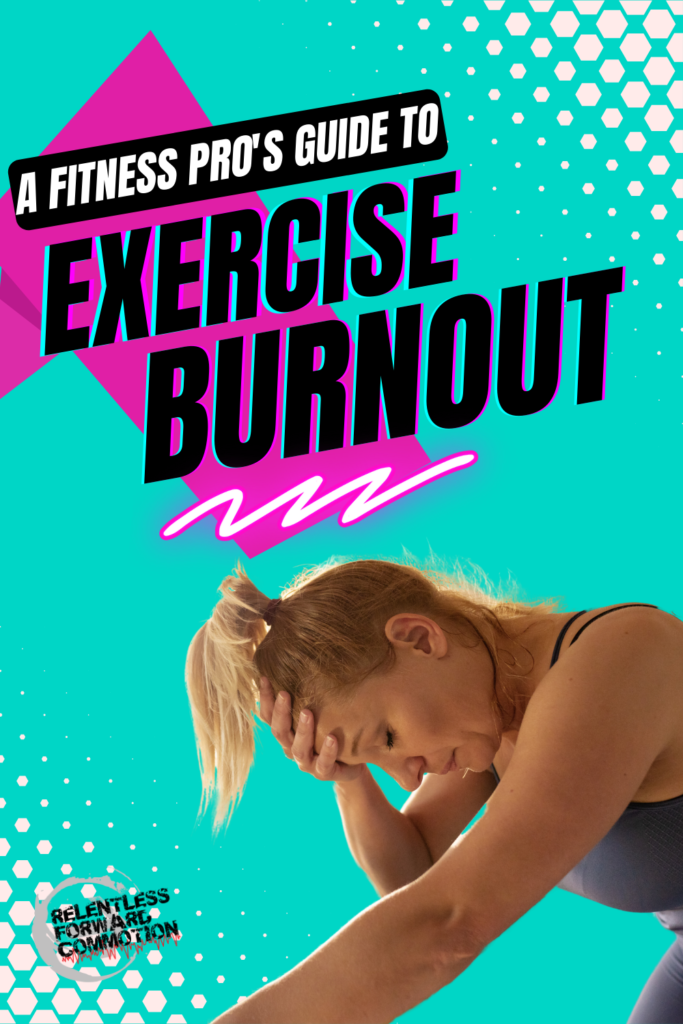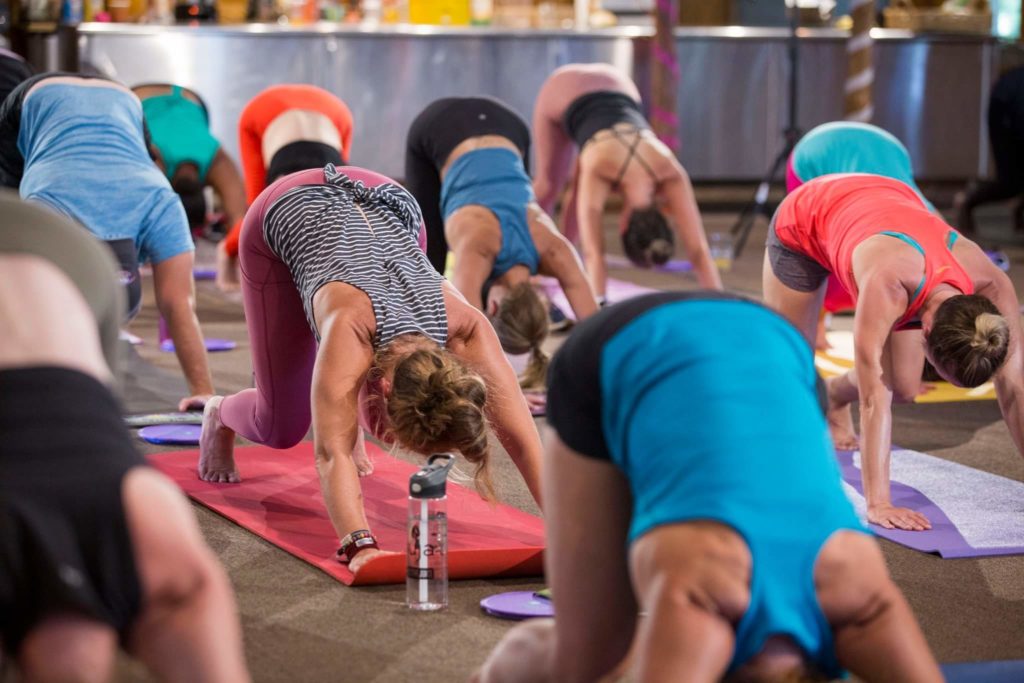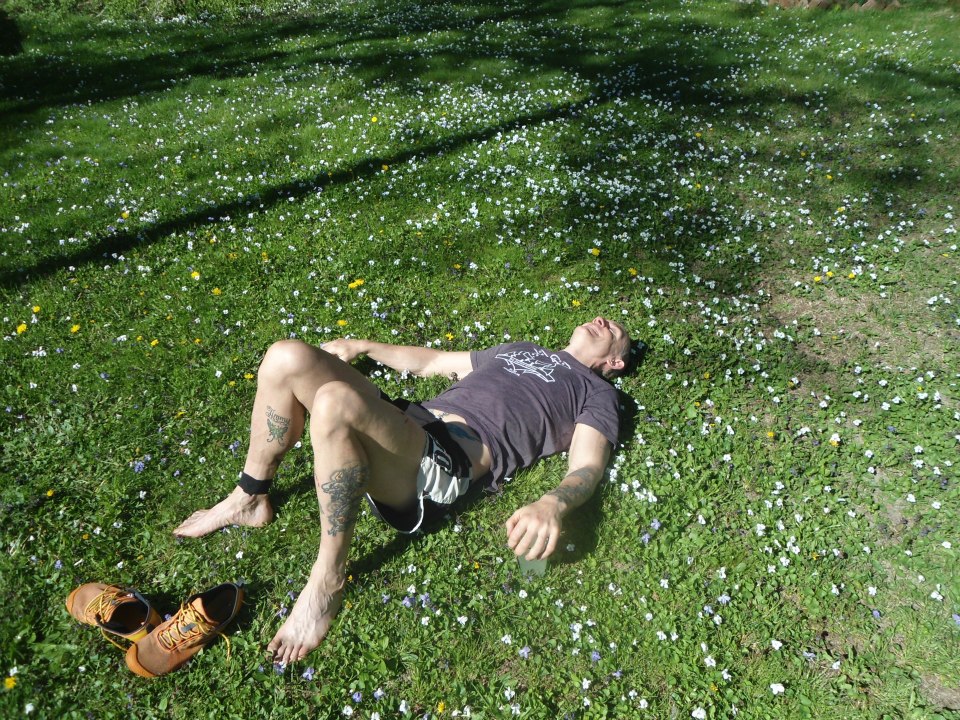Last Updated on October 1, 2022 by Heather Hart, ACSM EP, CSCS
In a world where we are seemingly rewarded for pushing ourselves out of our comfort zones, and applauded for not making excuses, experiencing training or exercise burnout can feel impossibly frustrating.
My name is Heather Hart. I’m an exercise physiologist and strength & conditioning coach who has been working in the fitness industry in a number of capacities for the last 15 years.
Throughout my training and coaching career, I’ve seen plenty of fitness seekers and athletes with the best of training intentions unknowingly run themselves right into the land of exercise burnout.
And if we’re being honest, I’ve suffered from training & exercise burnout myself (more than once).

I know first hand that while you’re in the middle of the burnout-black-hole, it may feel impossible to escape from. But I assure you that there is not only a way out of that proverbial hole, but hope that you’ll feel enthusiasm and energy surrounding your training or exercising once again.
In this post we’ll cover the ins-and-outs of training and exercise burnout, so you’ll know what it is, why it happens, how to get past exercise burnout if you have it, and how to avoid suffering from it again.
Let’s dive in:
What is Exercise Burnout?
Exercise burnout is a catch-all phrase for when someone is experiencing lingering high levels of physical and emotional stress, lack of motivation, fatigue, and maybe even a plateau or decrease in fitness, all attributed to exercise or training.
While acute fatigue immediately after a tough workout is normal and often expected, feelings of burnout feel as though they accumulate over time, regardless of workout intensity.
What’s more, “burnout” feelings tend to stick around even after taking a day or two off from exercise.

Is it Exercise Burnout or Something Else?
While exercise burnout is a generic term, there are a handful of very specific and related conditions in the exercise/sport world that athletes may suffer from.
Functional Overreaching:
purposeful training at a much higher volume or intensity than normal, AND higher volume or intensity that is not immediately matched with adequate rest, in order to make specific training adaptations. Typically takes a day or two to recover from.
Nonfunctional Overreaching:
pushing too hard (either in volume, intensity, or both), resulting in an extended period of decreased performance, and takes more than a few days to recover from.
Overtraining Syndrome:
a chronic condition brought on by overtraining (doing more “work” than your body can physically tolerate), and is characterized by performance decrements and an overall breakdown in physiological function. Overtraining syndrome is relatively rare, and may take months to years to recover from.
Relative Energy Deficiency in Sport (RED-S):
Not taking in enough fuel through food to meet the energy demands placed on the body by the amount of exercise being performed. This can lead to declining health and exercise or sport performance.

For more information on these conditions, check out the post:
Overtraining vs. Overreaching in Runners – Running Burnout Explained
Why Does Exercise Burnout Happen?
Exercise burnout can happen for a number of reasons. Some of the more common reasons I’ve witnessed include:
Initial Over-Enthusiasm
We’ve all heard the saying “too much of a good thing can be a bad thing”, and exercise is no exception. Oftentimes new exercisers, or those returning to fitness after a long time off, may set lofty fitness or training goals that they are bound and determined to accomplish as soon as possible.
Unfortunately, this over enthusiastic attitude often leads to physical and even more so mental burnout when the enthusiasm wanes, and feelings of overwhelm takes its place.
Improper Programming (Or a Complete Lack of Programming)
In general, exercise doesn’t have to be complicated. Move your body, increase your heart rate, challenge your muscles, end of story.
Except…when you are trying to reach a specific fitness or sport goal, the programming of your training does start to matter.
A lot of new exercisers seem to believe that fitness gains occur DURING exercise. In reality, adaptations to exercise and training happen during periods of rest. Pushing yourself incessantly may seem like the best approach to reaching your fitness goals, but in reality, rest and recovery is just as important.

There needs to be a purposeful balance between bouts of stress (the actual exercise) with bouts of rest and recovery (when the adaptations to exercise occur), as well as a purposeful build in the amount of stress imposed (the Principle of Overload).
Too much stress and not enough recovery can lead to not only exercise burnout, but perhaps actual overtraining. Not enough stress may prevent you from reaching your goals, which can lead to mental frustration, and potential burnout.
Unclear Goals
It can be incredibly difficult to stay motivated to exercise if you aren’t sure why you are exercising in the first place.
Now, I’m not saying everyone has to go sign up for their local half marathon or register for a bodybuilding competition. Rather, finding your personal “why” – whether it’s to gain enough endurance to chase your grandkids, or build enough strength to lift your elderly, 60lb dog into your SUV – can help give you motivation when you’re having an off day.
Lack of Variability in Mode or Intensity
Doing the exact same exercise or exercises over, and over, and over again may seem like a great way to achieve discipline. But it’s also a great way to achieve boredom, and possible burnout.
Telltale Signs You May Have Exercise Burnout:
The following are common symptoms among those suffering from training or exercise burnout:
Lack of Motivation
You used to be excited to head to the gym, meet your friends for a group exercise class, or hit the pavement for a run. But now you find yourself dreading exercise, or making excuses not to go, and you can’t seem to pinpoint exactly why.
If you start a workout, you may find yourself cutting the workout short, or half heartedly going through the motions.
Exhaustion
You are plagued with feelings of exhaustion. Not just after that difficult bootcamp class, but seemingly all of the time. No amount of caffeine or an extra 30 minutes of hitting “snooze” after your alarm clock goes off seems to help.
Irritability or Change in Mood
Feeling sad for no apparent reason? Unexpectedly snapping at your spouse, kids or co-workers? Finding yourself irritated over small things that never may have bothered you before?
Unexpected mood swings for no other explainable reason may be attributed to training burnout.

Lingering Soreness
Occasional soreness is not unexpected when it comes to exercise and training. But soreness that lingers or doesn’t resolve itself 24-48 hours after onset is not normal.
If you feel as though you are constantly sore and it just won’t go away, you might be suffering from burnout.
Not Making or Losing Progress
You’ve plateaued. Whether it’s with how far you can run, how much you can lift, or even weight loss, it seems like you are stuck. What’s worse, doing more doesn’t seem to help.
Or even worse, exercises or routines that used to be achievable, or maybe even easy, are now a struggle to get through.
Symptoms of Something More Serious:
The following may be warning signs that you are dealing with a situation greater than exercise burnout. If you are experiencing any of these, please refer to a medical professional immediately:
- Repeated Missed Menstrual Cycles: 3 or more missed menstrual cycles could be a symptom of RED-S (formerly known as the female-athlete-triad)
- Extreme Soreness & Swelling: Extreme soreness, with or without swelling, experienced after a workout could be a symptom of an injury, or a serious medical condition known as rhabdomyolysis. Rhabdo can cause permanent disability or even death, and should be treated by a medical professional immediately.
- Acute or Chronic Pain that Inhibits Movement: any sort of pain, whether it is acute (short term) or chronic (lingering) that inhibits your natural movement could be indicative of an injury.
- Constant Illness or Injuries: If it feels like you are constantly catching colds or viruses, or suffering from a new ache, pain, or injury every single week, it might be time to visit your doctor.
Expert Tips for Preventing Exercise Burnout:
If you’re currently experiencing exercise burnout, or simply want to avoid ever falling into the burnout-trap in the future, keep these tips in mind:

1. Follow a Plan (or Hire an Expert)
A pre-designed training plan, created by a certified, experienced coach, personal trainer, or other fitness professional, will ensure that your training contains a proper balance between stress (essentially, the workouts) with recovery (where growth and improvements actually occur).
Further, following a plan will ensure that your training or exercise volume – whether it’s running, strength training, etc – increases at a slow, safe rate,that will help prevent overuse injuries.
Having an expertly written training plan will also take the guesswork out of your training.
And lastly, the accountability can help prevent those “I don’t know what I should do in the gym/on the road today, so maybe I’ll just stay on the couch” types of days.
Experiencing Burnout Right Now? Consider hiring a trainer or paying for a consultation with a coach to take a look at what went wrong with your current workout routine. Sometimes a second set of eyes – especially from a seasoned professional – can help you pinpoint what might have contributed to your current burnout.
2. Include Variety
A well rounded training or exercise program should include variety in type and intensity of exercise. Be sure you are including:
- Strength training exercises
- Cardiovascular exercises
- Hard effort training days
- Easy effort training days
- Active Recovery days
- Rest days (more on this one soon!)
When it comes to training for a specific sport, the Principle of Specificity does matter. But, cross training with other activities will allow an athlete to build their cardiovascular endurance and muscular strength while allowing the muscles and joints to recover from the regular, repeated movements associated with their main sport.
For example, activities like cycling and swimming challenge the cardiovascular system in the same fashion as running, while putting less impact on the lower body.

Not a self described “athlete”, but a fitness enthusiast or health seeker? The concept remains the same. Stray from your normal routine and try something new. Maybe it’s that Zumba or pilates class you’ve been eyeballing. Maybe it’s finally incorporating weight training into your fitness routine. Perhaps it’s skipping the gym for the day and heading to the trails for a long hike instead. You get the idea!
3. Respect Rest Days and Recovery Periods
This is easily the most obvious suggestion, but also the most widely ignored one as well. In a training program, rest days are equally as important as those harder workouts.
Yes, rest days, or even full recovery/deload weeks can be hard to take when you are excited, motivated, and thoroughly in the “training zone”, but they are absolutely imperative.

For my clients, rest days are non-negotiable. Proper rest and recovery gives your body time to heal and recover from all of your workouts. Further, periods of rest allow time for your body to develop muscular gains.
Experiencing Burnout Right Now? Give yourself permission to take a break. There is plenty of research demonstrating that a few days, or even a week, will not be detrimental to your fitness gains.
4. Prioritize Sleep
Make sure you are getting the necessary amount of sleep. For many adults, “necessary” and “enough to make it through the day” are often not the same thing.
I fully understand this is easier said than done for some, especially the mom & dad crowd.
Not only will sufficient sleep help you feel mentally rejuvenated, but your body needs sleep for recovery purposes. Human growth hormone, which is largely responsible for tissue growth and repair, is mainly released during sleep. Massive amounts of muscle tissue recovery and remodeling happens during sleep.
Further, ensuring you are well rested means you’ll have the energy to successfully tackle your next workout.
5. Balance Training with Life “Stress”
I frequently remind my clients that as far as our bodies are concerned, “stress is stress”. While it may technically be more nuanced than that, the fact is that life stress can have a huge effect on your fitness and training status.
Your training or exercise routine may be perfect, but if you are experiencing a lot of other emotional stress (family, work, relationship, etc.) or physical stress (a physically demanding job, at home projects, etc.) you run the risk of physical and mental burnout from doing too much.
Don’t be afraid to back down on your training or exercise routine, if necessary, during times of high physical or emotional stress elsewhere in your life.
6. Pay Attention to Hydration & Nutrition
Disclaimer: none of us are perfect when it comes to our hydration and nutrition habits. But when staying properly fueled and hydrated will not only help make exercise more enjoyable, but promote faster recovery and adaptation to that exercise.
- Eating a diet rich in whole foods, such as fruits, vegetables, lean proteins, and whole grains, as often as possible will better help fuel your body than a diet of junk food void in proper nutrition.
- Eating ENOUGH calories to fuel your exercise and recovery will leave you feeling physically and mentally refreshed.
- Post workout, refueling with a snack or meal containing a 4:1 carbohydrate to protein ratio will help replenish depleted stores of muscle and liver glycogen that were utilized during your workout, as well as help your body get a jumpstart on muscle recovery and repair.
- Drinking plenty of fluids before, during, and after exercise will ensure you maintain a healthy hydration status. Water aids many of your bodily functions, including healing muscles and body tissue, helping prevent illness, and preventing feelings of lethargy.

7. Make Exercise FUN!
Exercise doesn’t have to be serious business ALL of the time. What’s more, I highly encourage people to find a form of fitness that they find enjoyable MOST of the time.
Don’t like running? You don’t have to do it! Other forms of cardiovascular exercise, like swimming, or dancing, or riding a bike can be just as beneficial to your heart, lungs, and body as a whole.
And even if you have a specific training discipline you focus on, don’t be afraid to switch it up and have a little fun from time to time. Try a new class. Sign up for a “fun run” such as a color run or a beginner mud or obstacle course race.

If you feel that mental fatigue or boredom is beginning to set in, do not be afraid to swap out a training date with something “fun”. One day of missed training won’t hurt your end goal, and if anything, the mental break may be exactly what you need to continue on towards your end goal.
Athletes and fitness enthusiasts often walk a fine line between pushing themselves to become stronger, and pushing to the point where they may experience burnout. Training burnout, while very common, can certainly be avoided by taking the proper preventative measures to keeping your body and mind healthy.
Heather Hart is an ACSM certified Exercise Physiologist, NSCA Certified Strength and Conditioning Specialist (CSCS), UESCA certified Ultrarunning Coach, RRCA certified Running Coach, co-founder of Hart Strength and Endurance Coaching, and creator of this site, Relentless Forward Commotion. She is a mom of two teen boys, and has been running and racing distances of 5K to 100+ miles for over a decade. Heather has been writing and encouraging others to find a love for fitness and movement since 2009.

jillconyers
Agreed. If only I had known all of this when I first started running.
Happiest of holidays to you Heather!
Heather
Thank you Jill! Happy Holidays to you as well!
fitfoodiemama
As I hover over the button to register for my first marathon, my biggest hesitation in hitting it is getting burnt out in the training process. My first love is functional training so incorporating cross/strength training is not my biggest issue; it’s rest. I also would love to find a plan that incorporates strength training in with marathon training (ideally not running more than 3-4 days a week)- if you know of any good ones, let me know! 🙂
Heather
I’ll keep my eyes open! I’ve always personally substituted one of the shorter run days (though not a tempo or speed work, those are important) for functional training like plyometrics, etc. In the end, the most important run (in my opinion) is the long run, so as long as you get that one in, I think skipping a different run for a different form of training isn’t going to hurt. That is general advice though, and varies from person to person!
Deborah @ Confessions of a Mother Runner
I’ve certainly felt burnout before while training for a tri or a half. Most of it comes from not enough rest/sleep or putting too much pressure on myself. i have to remind myself that I am not a prof athlete!
Heather
Yes! Too much work/not enough rest is always a recipe for disaster!
Amanda - RunToTheFinish
I wrote about this awhile back and couldn’t agree more with HAVE FUN. We don’t have do to this, I think that’s what always drives me bonkers. There are tons of ways to be fit, so if you stop loving what you are doing try something else
Heather
It truly is the most important part, in my mind. Life is too short to NOT have fun, especially while doing something we love so much!
Linz
all such good advice! i definitely like having a plan, switching things up, and setting goals!
Heather
Thanks Linz!
Rachel
Great job on your PR. I love your tips. I had a bit of a burn out this past year… and set aside “competing” and ran JUST FOR FUN. It worked. HOwever, now jumping back into training mode is a struggle because I just want to run for fun still. 😉
Heather
Yes! I’m in that same in-between-zone myself right now. I’m ready to focus on training for a race again, but I also want the freedom to do whatever I want to do in the gym. It doesn’t work both ways, lol!
Montana Ross
I have definitely had burnout before, which has led to me cutting back significantly in my training. But now I try to incorporate a “new class day” when I’m feeling bored because it helps me get a fresh perspective. This was a great reminder!
Heather
I love the idea of “new class day”! Thanks for sharing!
Skinny Fitalicious
I have experienced burnout. I’m just too stubborn and determined for my own good even though I know all these things.
Heather
Ugh, yes, I have “stubborn” in my DNA, so I feel you!
organicsandra
Fantastic tips Heather! If you never take or add in cross training then burn out is sure to come your way!
Heather
Agreed! Thanks Sandra!
Katie (@momslrb)
Cross Train!
MCM Mama (@mcmmama)
Good tips. For me, I have to have “fallback” weeks and sometimes I fall waaay back. It’s like my mind needs as much of a break from the mileage as my body does. I’m about to head into another heavy training cycle and I’m worried about staying sane during it.
Heather
ABSOLUTELY! I try to incorporate those weeks into my training as well. Good luck with your next cycle! What race are you currently training for?
Janice- The Fitness Cheerleaderj
Great tips! Keeping my training FUN with a training partner really helps too. I used to suffer from burnout after training for a BIG goal race, but having to re-build up all of the lost strength and endurance from coming to a complete stop several times really helped me to learn to fight through the burn out. That burnt out feeling is often a sign of overtraining too. Have a Merry Christmas!
Heather
Yes, a running partner makes a world of difference! Great motivation to get you out there when you don’t feel like training. Merry Christmas to you too Janice! 🙂
Rebecca @ Strength and Sunshine
These are all so perfect! Yes to all of them! The only area I need to work on is rest!
Heather
That is indeed the hardest one to do! 🙂
Kerri (@KerriOlkjer)
This was so me when I began running! I had to learn that for ME less miles are more.
Heather
Yes, me too! When I first took up long distance running, I nearly ran myself into the ground.
Femme Fitale Fit Club
I have experienced training burnout and I had to take a break and step away for a while. Once I showed back up a lot of times after a week or so I felt refreshed and actually stronger.
Heather
That often happens to me as well, I take a break and come back feeling stronger. A true sign that my body NEEDED the rest!